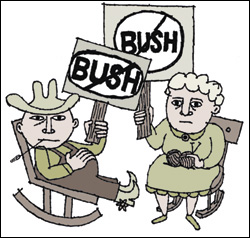Conventional wisdom on this fall’s election is that, as in 2000, it will be decided by a narrow band of states on the border between Red—conservative, middle-America Republican partisans—and Blue—the coastal liberal types. This year, the thinking goes, the political spectrum is even more polarized than in 2000, with fewer undecided “swing voters” who could go either way depending on who the candidates are.
Except that the electorate has a funny way of defying conventional wisdom. Ask Howard Dean. And as I drove around Red America last week—specifically, Tennessee—George Bush’s support among his ideological cousins seemed thinner than ever. Of such doubts are political earthquakes born.
Three main things seem to be doing in Bush at the moment: an economy whose ever-encouraging economic markers refuse to trickle down to peoples’ own lives; the fiasco that is Iraq; and what, for lack of a better term, might be called the Bush Reality problem.
The latter is the hardest to define and yet, perhaps, the most critical in assessing Bush’s growing weakness as gleaned from newspapers, radio, and conversations among “his” people. A conservative political leaning, often as not, defines itself as born of conservative social values—being honest, for one, and dealing with the world as it is rather than as it ought to be, for another.
A George Will column, appearing last week in several hundred Red America newspapers, blasted Bush on precisely this score, specifically for Bush’s recent stunt of deflecting a policy question by attacking doubters as the “some people” who don’t think “brown people” can govern themselves. (Will also noted, correctly, that Bush’s comment presumes that Bush considers America to be white—and I would add that people who inject race into a color-blind discussion are usually people who are themselves obsessed with race. But I digress.)
Will blasted the Bush cabal on several fronts that have long infuriated liberals: the intolerance for dissenting views within the administration, the willful refusal to acknowledge reality when it interferes with ideology, and the “with us or against us” mentality that politicizes everything and that has done so much to divide America.
As Bob Woodward chronicles in his two recent books, such thinking is central to how the key figures in the Bush administration, up to and including Dubya, operate. These are not simply liberal quibbles. Indeed, one of the ironies of the Bush managerial style is that our self-touted MBA president, the guy who was gonna come in and run government like a big business, would never get past middle management in any company worth its share value. No good manager, let alone a CEO, surrounds himself with yes people and refuses to entertain doubts or ask “what if” in the way that Bush does. (Perhaps what Dubya meant was that he would run government for big business. Again, I digress.)
Iraq is proving, in ways large and small, to be the undoing of the Bush administration, and they’ve done it to themselves. This was the war they wanted, they planned, and they started. And from the refusal to acknowledge casualties to the trivialization of Iraqi resistance fighters and Iraqi public opinion, to the privatization schemes that have ruined Iraq’s fragile economy and infected the U.S. military effort, and on and on, this war is a showcase for the failure of Bush ideology when it meets the real world.
Americans, whether for or against the war originally, are figuring that out, and they’re taking offense to it. War is not something one plays around with, because the consequences of ignoring its realities are deadly. And so it has been in Iraq. Some of Bush’s fiercest critics these days are former military folks, hardly pacifist types, who see a dreadfully mismanaged war effort that has put undertrained and underequipped soldiers and reservists in impossible situations.
But the steady presidential insistence on everything-is-better-than-it-looks also infects the economy. Our “recovery” consists of record numbers of people giving up looking for work, settling for part-time or degrading jobs that don’t really pay the bills. They’re relying on relatives or spouses or savings or whatever to make ends meet. Tax cuts for the wealthy haven’t worked—but in Bush’s world, that just means we need more of them. By that logic, maybe we should invade more countries, too.
If George Bush loses in November—and the race is his to lose, not Kerry’s to win—it will be because of questions of competence, not ideology. Slowly but surely, the sense seems to be growing in Red America that this crew of ideologues is incompetent. If that impression doesn’t turn around, all the advertising money in the world won’t help in November.







